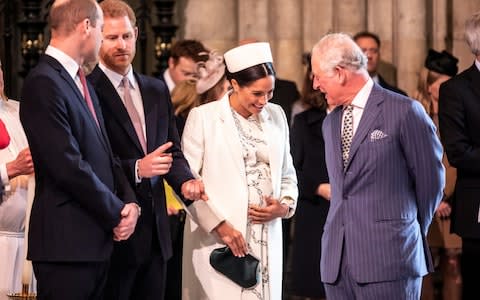Solved: The social media mystery of Prince Charles and the 'American' spelling

When the Prince of Wales published a letter of condolence to the French president after the Notre-Dame fire, he intended to convey to the nation his heartfelt sympathies.
He may not have expected to become embroiled in one of the more bizarre royal internet conspiracy theories to date, nor to have inadvertently educated a generation in the finer points of 17th century English spelling.
The Prince, who habitually uses the “ize” ending to words such as “realize”, left the internet-reading public questioning whether an American had been writing his letters for him.
Perhaps, some more far-fetched theories wondered, his daughter-in-law the Duchess of Sussex could be aiding him with his work while on maternity leave?
In fact, royal sources said, the letter was merely a continuation of the Prince’s lifelong preference of using older English spellings, considered correct by the Oxford Dictionary of English.
A post shared by Clarence House (@clarencehouse) on Apr 16, 2019 at 4:48am PDT
The letter, printed on Clarence House headed writing paper and reproduced on the palace’s social media pages, read: “My wife and I were utterly heartbroken to learn of the terrible fire at Notre-Dame Cathedral this evening and wanted to let you know immediately how much we are thinking of yourself and the French people at this most agonizing of times, and of the emergency services who are so bravely tackling the blaze.
“I realize only too well what a truly special significance the Cathedral holds at the heart of your nation; but also for us all outside France it represents one of the greatest architectural achievements of Western Civilization.”
Social media users were quick to point out that “agonizing, realize and civilization” would more usually be spelled “agonising, realise and civilisation” in English, with the -ize suffix more commonly used in America.
“Are you an American or the future king?” one wondered, while another suggested: “Maybe it was written by an American. Maybe Charles dictated a letter and Meghan wrote it up lol.”

The conspiracy theory was further compounded in the wake of the launch of the Sussex Royal Instagram page, in which the Duke and Duchess of Sussex have used an array of American spellings and words - such as diaper - in their official communications.
Fans believe the Duchess has taken control of social media communication herself, drafting messages in her distinctive voice to share with the world.
At Clarence House, however, there is no such confusion.
Examination of the Prince’s letters showed that he has regularly chosen to use an -ize suffix, in a habit unusual in modern English but nevertheless correct.
The Oxford Dictionary of English lists realize, agonize and civilization only under their “z” spellings, giving the -ise version as a variation in parenthesis.

Both “realize” and “civilization”, it notes, have origins in early 17th century French, while “agonize” could come from late 16th century French, or the late Latin “agonizare” from the Greek “agonizesthai”.
A blog explaining the matter, published in 2011 by Oxford Dictionaries, states: “There’s a widespread belief that these spellings belong only to American English, and that British English should use the ‘-ise’ forms instead, i.e. realise, finalise, and organise.
“In fact, the ‘-ize’ forms have been in use in English spelling since the 15th century: they didn’t originate in American use, even though they are now standard in US English.”
It cites the first example for the verb organize in the OED in around 1425, from an English translation of a treatise on surgery written by the French physician Guy de Chauliac describing how “in euery partie is organized one vertue”.

 Yahoo News
Yahoo News 
